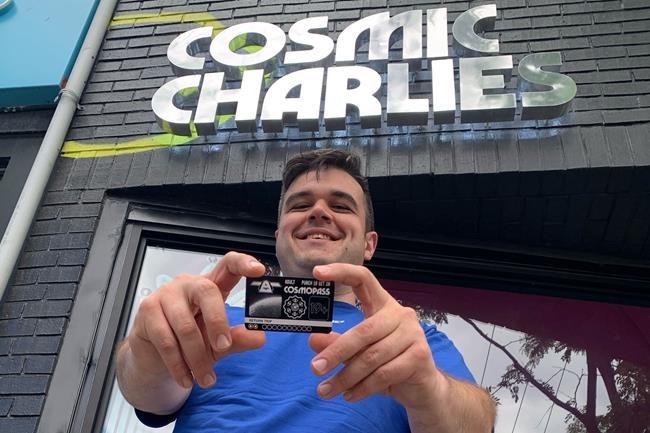TORONTO — It's hard to miss the smattering of cannabis store signs aiming to lure in customers with deep discounts and flashy membership programs along the stretch of Front Street East leading to Toronto's St. Lawrence Market.
Outside Civilian House of Cannabis, one sign promises 15 per cent off and encourages membership to the Club Civilian loyalty program, which offers even more savings on marijuana and access to special events at owner Ink Entertainment's Rebel nightclub.
A few doors down at Canna Cabana, discounts are even steeper, hitting 70 per cent on accessories. The store promises "unbeatable" prices and Canna Club members routinely pay anywhere from a few dollars to $50 less than market prices on some items.
While welcomed by customers, the promotions playing out along that strip — and in many neighbourhoods across Canada — signal an intensifying war on prices in the cannabis market.
The push to slash prices is so significant industry members worry how independent retailers and even some franchisees can stay in business.
"There's a lot of independent retailers who have mortgaged their house, they put all their savings into their store, and it's such an oversaturated competitive market," said Lisa Campbell, cannabis marketing company Mercari Agency's CEO.
"Price is the key to success in these areas, and we're seeing quite a few stores close as a result of lowering margins for the retailers."
In some regions, like Ontario, stores must order cannabis from provincial pot distributors like the Ontario Cannabis Store, but have flexibility over how much to charge consumers.
The average price for cannabis was $11.78 per gram at the start of 2019, shortly after legalization, but fell to $7.50 per gram in 2021, a November report from Deloitte Canada and cannabis research firms Hifyre and BDSA said.
The average price for vape cartridges has similarly fallen by 41 per cent from $32.02 per gram around legalization to $19 per gram a year later.
The report showed price is the leading factor contributing to Canadian cannabis sales, with 34 per cent of consumers naming it their top consideration.
Though much of the push for lower prices is led by an industry desperate to squeeze out illicit dealers and dispensaries, the explosion of pot shops is also a trigger.
Ontario alone has 1,333 stores and with all hawking the same items, standing out has never been tougher and loyalty programs, which are mostly free to sign up, have never made more of a difference.
Canna Cabana, for example, found same-store sales rose by 48 per cent since its loyalty program's October launch.
"Everybody has a loyalty program and it's so competitive that it's kind of required or I felt that it was," said Sean Kady, co-founder of Cosmic Charlies, a Toronto cannabis shop.
"We're all selling the same products... so it's hard to differentiate. Price is the main thing for consumers."
Cosmic Charlies' loyalty program is a stamp card called Cosmo Pass that gives members 10 per cent off their first purchase for signing up. Then, every 11 purchases, they get 20 per cent off.
In the six months since its launch, customers have responded well and Kady said he sees an uptick in visits when members are notified of new promotions.
But it's "daunting" to keep up with competitors, he said.
Many give discounts for seniors and veterans, some like Tokyo Smoke offer $2 deals every Wednesday and price matching is common too.
Campbell saw many stores resisting such incentives since cave because inflation climbed to a near 40-year high and customers increasingly sought the lowest prices.
They're most often found at Canna Cabana. The High Tide Inc.-owned chain with 128 stores across five provinces is staying ultracompetitive with its Cabana Club, a lowest price guarantee and lottery style scratch cards promising up to $850 in prizes.
Campbell feels the chain is "crushing the game," while Kady calls it "a beast."
A recent visit to one of its Toronto locations showed 14 grams of MTL Cannabis' Sage n' Sour dried flower selling for $85.47 for members, 32 per cent less than the $125.99 market price and 26 per cent less than the $114.97 it was listed for at the Ontario Cannabis Store.
The company is able to offer such steep cuts because it got out of the wholesale business, so it could pass on discounts to customers, said High Tide CEO Raj Grover.
Those discounts will expand, when he launches Cabana Elite, a paid version of the Cabana Club loyalty program later this year.
Is he worried about copy cats? No, said Grover.
"We've always been innovative ... and I don't really pay too much attention to what the next guy is doing," he said. "We just put our head down."
Jaclynn Pehota, executive director of the Association of Canadian Cannabis Retailers, sums up what's happening in the industry as a "race to the bottom" that will have many victims.
"It is impossible for a privately-held small business to compete with a national, publicly-traded company that is backed by international funding," she said.
"It is a ludicrous proposition."
She suspects many of the big cannabis chains are adopting a Starbucks-like model, where they flood the market with stores, eventually cutting out the competition and becoming the dominant player.
She foresees many businesses closing, as a result, and consumers feeling the brunt.
"We're going to see a much less vibrant and colourful market and much narrower spectrum of brands that are functioning," Pehota said.
"I personally don't believe in the long term that's going to be a positive thing for the Canadian cannabis consumer."
This report by The Canadian Press was first published August 3, 2022.
Tara Deschamps, The Canadian Press



